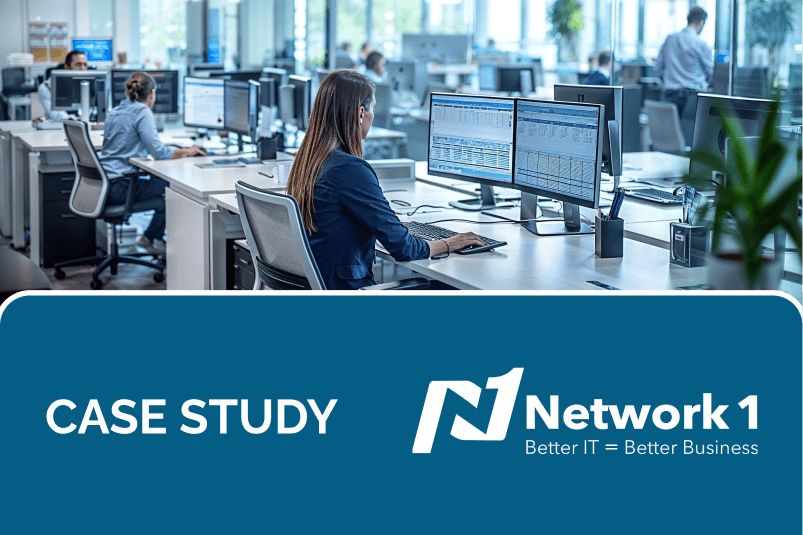Leverage Expert Guidance Throughout Your Cloud Migration
Reduce costs, meet project timelines, and transition to the cloud with a secure process built for reliability.
Why choose Network 1 Consulting for cloud migration services?
- Assess cloud readiness with a tailored evaluation to prepare your business for migration.
- Develop a strategic plan with a budget, timeline, and roadmap aligned to your needs.
- Minimize downtime with expert support ensuring a seamless digital transformation.
- Migrate securely to Azure, Microsoft 365, and other leading cloud platforms with confidence.
- Empower your team with training to maximize efficiency in the new cloud environment.
Request a Quote For Cloud Migration Services
Our Partners









Clients Who Already Benefit From Our Cloud Migration Services
What Makes Us a Trusted Cloud Migration Partner
25+
Years of delivering excellent cloud solutions
4,292+
Active end-users receiving support
25 Min.
Or less is our average response time to support requests
Our Featured Cloud Migration Services
Build a Cloud Migration Plan That Fits Your Needs
Rushing into cloud migration without a clear plan often leads to overspending or configuration issues. Many businesses underestimate the complexity of aligning resources, timelines, and technical requirements, which can cause delays and avoidable costs.
Network 1 Consulting will help you build a plan before your migration begins. We’ll assess your existing environment, goals, and available resources to develop a strategy tailored to your business. Our team also uses current best practices to guide every recommendation.
You receive a structured approach that supports your long-term goals while minimizing disruptions.
Easily Decide What to Migrate and What to Retire
Outdated systems can slow down your cloud plans and increase long-term costs. Without a clear evaluation, you may move tools that no longer serve your business or overlook better alternatives.
Network 1 Consulting can assess your current systems and applications to help you decide what to keep and what to retire. For those that should move, we map out the most effective way to integrate them into your cloud environment.
We’ll give you a clear path forward that aligns with your goals and simplifies your cloud infrastructure.
Choose The Right Cloud Foundation
Choosing the wrong cloud setup can lead to performance issues, wasted budget, or poor integration with your existing systems. Many businesses struggle to match their goals with the right provider or service model.
Network 1 Consulting will design your cloud architecture around your specific requirements. We help you choose the right mix of services and select a provider that aligns with your operations, workload, and budget.
You get a framework built for long-term growth and day-to-day performance. With our support, your cloud foundation will work the way you need it to.
Avoid Risks With Secure Cloud Configurations
32% of cloud security incidents happen because of misconfigurations. Without the right setup, your business faces compliance gaps and unnecessary risk.
You can trust Network 1 Consulting to configure your cloud environment to align with your security requirements and all compliance frameworks that apply to your industry.
With a secure, properly configured environment, you reduce risk and stay audit-ready. Make sure that your cloud setup supports both protection and performance.
Validate Workloads Before You Go Live
Even after your migration, missed configuration errors or broken integrations can slow down operations or disrupt business services. Without thorough testing, small issues can escalate once workloads are live.
Network 1 Consulting will support you post-migration by validating that all application components communicate correctly and services function as expected. We use a mix of automated and manual checks to confirm readiness.
This reduces strain on your internal team and makes your transition from migration to day-to-day operations smoother.
Benefits of Letting Us Help You With Your Next Cloud Migration

Minimize Disruptions During Cloud Migrations
Migrating to the cloud can disrupt daily operations if not properly managed. Slow systems, unavailable files, or downtime during peak hours can impact productivity and frustrate users.
Network 1 Consulting will prevent this issue by creating a migration plan built around your operational needs.
We schedule data transfers outside of business hours, use phased rollouts to avoid full-system downtime, and set up temporary failover systems when needed. We also test every step in a staging environment before pushing changes live.
Our approach keeps your teams connected and working while we manage the transition.

IT Support Services That Keep Your Cloud Migration on Track
Technical issues during cloud migration can create costly delays. Common problems like file sync failures, broken application links, or permission conflicts often interrupt the process.
That’s why Network 1 Consulting offers hands-on IT support during cloud migrations. Our team can troubleshoot migration-specific issues such as failed scripts, DNS errors, and security policy conflicts.
You receive reliable assistance through every stage of the process. Reduce downtime, maintain data integrity, and improve system performance thanks to our support.

Keep Your Data Transfers Secure During Your Migration
Cloud migrations can expose sensitive data if proper protections aren’t in place. Whether you’re moving from on-prem to the cloud or between cloud providers, risks like interception, data loss, or misrouting can occur. These problems often stem from missing encryption or weak access controls.
Network 1 Consulting protects your data by encrypting it during transfer, applying strict access policies, and verifying the source and destination before any migration begins. We use secure protocols like SFTP or HTTPS and confirm file integrity at each stage of the process.
Our approach reduces the risk of unauthorized access, data corruption, and transfer failures throughout the migration.
Learn More About Our Cloud Services
Cloud Migration FAQs
A cloud migration can take anywhere from a few weeks to several months. The timeline depends on the size and complexity of your IT environment.
Moving a few applications takes less time than migrating an entire infrastructure. Planning, testing, and resolving compatibility issues add to the duration.
Working with an experienced cloud migration partner can help keep the process efficient and reduce the chance of delays.
Your software licenses may need to be updated or replaced when you move to the cloud. Some licenses allow cloud use, while others do not.
You must check each vendor’s terms before migrating. In some cases, you can transfer existing licenses. In other cases, you must buy new ones through a cloud provider.
Reviewing license agreements early helps you avoid compliance issues and unexpected costs.
Moving to the cloud reduces hardware maintenance, lowers capital expenses, and improves scalability. You can adjust resources quickly as your business needs change.
The cloud also supports remote work, data backup, and disaster recovery more easily than on-premise servers. Plus, updates and security patches happen faster with cloud services.
These advantages help you operate more efficiently and reduce long-term IT costs.
The cloud migration process will differ slightly depending on your starting point.
Moving from on-premise servers often involves more planning, hardware assessment, and application readiness checks. You may need to refactor legacy systems or update software before migrating.
Moving from one cloud platform to another usually focuses on compatibility, data transfer, and configuration differences.
Each path requires a different strategy to reduce downtime and avoid disruptions.
After a cloud migration, you need IT support for monitoring, maintenance, and security.
Your team should manage system performance, apply updates, and respond to incidents. You also need support for user access, backups, and compliance.
If your workloads change, you may need help scaling services or optimizing costs.
A managed service provider can handle these tasks and free up your internal resources if needed.







